Gallup: More Conservatives than Liberals in the United States
If the trend continues, 2010 will mark a record number of conservatives for the Gallup poll since it began asking the question in 1992.
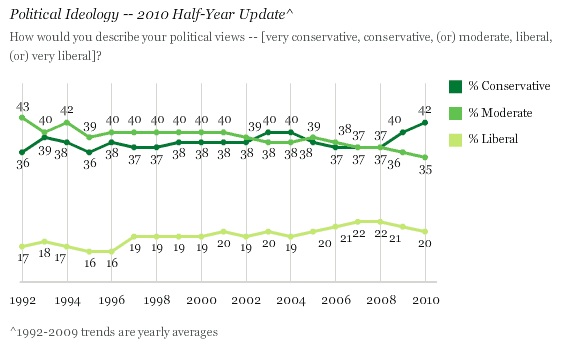 Via Gallup: In 2010, Conservatives Still Outnumber Moderates, Liberals
Via Gallup: In 2010, Conservatives Still Outnumber Moderates, Liberals
Conservatives have maintained their leading position among U.S. ideological groups in the first half of 2010. Gallup finds 42% of Americans describing themselves as either very conservative or conservative. This is up slightly from the 40% seen for all of 2009 and contrasts with the 20% calling themselves liberal or very liberal.
[…]
The ideological orientation of Americans seen thus far in 2010 would represent a record-high level of conservatism (since at least 1992) if it is maintained for the full year.
The question is, however: what does this mean? I am not sure it means all that much, save for a measure of general dissatisfaction with the direction of the country, especially the economy, at the moment. The basic range of variation is not that great over time. The averages are as follows:
%con: 38.21%
%mod: 39.00%
%lib: 19.16%
The place a variation over time is within whether people identify as “conservative'” or “moderate,” as the “liberal” numbers vary very little over the time of the chart and are especially stable since 1997.
Some thoughts:
First, these terms are pretty vague, in truth. We have imprecise ideas of what they mean and certainly individuals have their own personal definitions.
Second, it is more an issue of marketing than anything else. It has long been the case that being a “liberal” has had a negative connotation in the general public. One of the knock on MIchael Dukakis in the 1988 elections was that he was a self-identified “liberal.” Indeed, part of what the Democratic Leadership Council tried to do after that election was to redefine the Democratic Party in a way that they were not so readily identified as liberal, and that shaped the campaign of Bill Clinton in 1992.
Third, even with the recent uptick in self-identified conservatives, if we look at the chart and consider the actual electoral outcomes, during this period we have had both a two-term Democratic presidency and a two-term Republican presidency. As predictors of such things, these numbers aren’t too helpful. Consider, for example, as low-water mark for being liberal (17% in 1992), we elected a Democrat. To specify what I am talking about here: our general ideological self-identification has remained within a fairly narrow range for almost twenty years, and yet there have been significant changes at the polls in terms of partisan victories and losses. As such, ideological self-identification does not appears to be an especially good proxy for understanding likely voting patterns.
Fourth, the likelihood is that the numbers reflect general dissatisfaction with the way the country is going at the moment—the current president is on the liberal side of the ledger and the economy and other issues are problematic, and so there is a reaction. That could explain as well, the 1992 36% number for conservatives—a recession had made the occupant of the White House at the time unpopular.
The bottom line is that while I suspect some conservative commentators will make a big deal out of these numbers, we are talking about a vague metric, ultimately, and one that really isn’t showing that much of a variation.


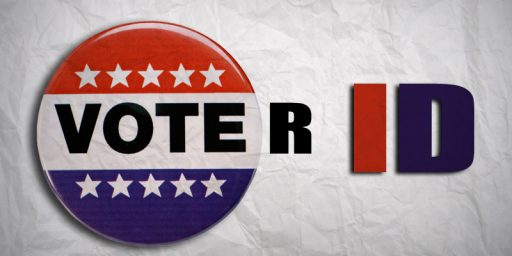
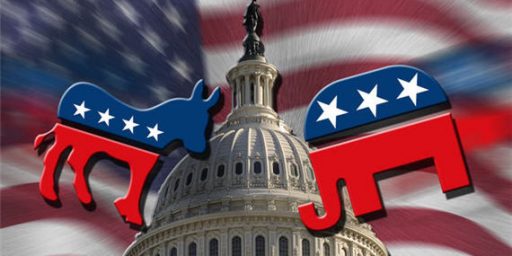
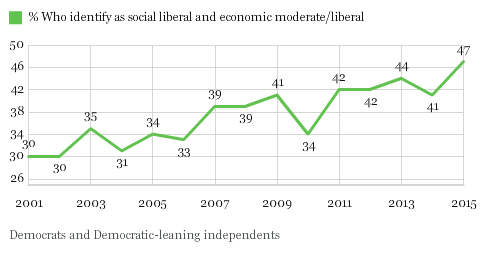
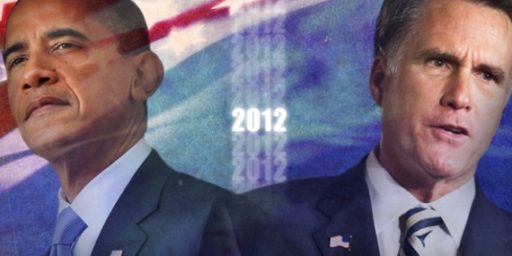
Especially given the number of times I’ve been called liberal at places like OTB, is the number really “moderate + liberal” = liberal?
Other than that, I’m disappointed by the decline of self-identified moderates. We are the only ones pragmatic enough to fix budgets and end wars …
What stands out is that self-identification as “moderate” is at it’s lowest.
Well, stay away from cable news for a couple days and we can all ignore this together.
Further muddying the waters are all the right-wingers who call themselves conservatives when they are anything but conservative.
John, moderates don’t have the backbone to take a stand. It is liberal budgets that need fixing. No one whats wars, but that no one is just on our side. Others do not seem to have the same opinion. If you are not willing to fight for your freedom, you will lose it. Conservatives have had the foresight to take on our enemies on lands outside of ours. Conservatives preserve the values that made this country great. Liberals and moderates are open to changes which remove our freedom.
LOL, I think you meant moderates can’t bring the crazy the way you do.
Further muddying the waters are all the left-wingers who call themselves moderate when they aren’t anything but Marxist stooges.
***moderate + liberal” = liberal?*** lol. maybe you could solve a budget:)
End a war, not so much, lose a war, hmmm, now there is a possibility.
Indeed, John. I like to refer to a John Stewart quote from time to time, where he stated that it’s kind of hard to imagine a protest with signs that say “Be Reasonable!”
While us moderates have a very clear stance on things, those things do vary from person to person. There’s a very clear and stated position shared by nearly all on the far right and on the far left. Being pro-gun and yet being in favor of a few mild regulations to make sure that they don’t get into the hands of ciminals doesn’t fit well into sound bites and protest signs because it’s just too darn complicated to explain when the guy next to you is yelling about some imagined “slippery slope.” (No, we’re not going to ban your guns just because we want you to register them? How do I know? Because I like having a gun.)
This is great! The Marxist stooges are battling the useful idiots of Big Business (aka libertarians).
Can I play, too?
Conservatives? Start a war? Excellent!
Well-defined missions with clear objectives and the resources to pull them off?
Not so much…
Blowing a hole in the budget and cutting taxes? Excellent!
Cleaning up the mess so the next administration can start clean?
Not so much…
God, I love this blog! The arsonists get to bitch at the firemen!
Most of the people I know that identify as “moderate” and yet almost always vote for one party vote Democratic. Most of the people I know that identify as “independent” and yet almost always vote for one party vote Republican.
It seems a general thing in politics that right-leaning folks tend to be more likely to identify as conservative than left-leaning folks are liberal, but that right-leaning folks are less likely to identify as Republicans even when conservative than left-leaning folks are to identify as Democrats. The Democrats rarely lose party identification contests even when they’re losing elections. Liberals rarely outnumber conservatives even when Democrats are winning elections.
It seems that conservatives are mostly conservative when it serves their political ends. Like shutting down unemployment benefits for 1.2 million long term unemployed in hopes of slowing down the economic recovery before the elections.
I’ve found that people generally are not very good at classifying their beliefs. I’ve ran into the situation where someone believes they are conservative cause their parents were and everyone know liberals hate the country but as soon as I start asking their stances on issues they end up taking the liberal stance more often then not…
I’ve linked to this before:
http://www.politicalcompass.org/
but if you think there is a better online test, please share.
Funny, but I think it can be true in set theory. Especially when you get the labeling aspect. Are what you call “liberals” a proper subset of the true liberal set?
I wish there were a better test. At least as far as American politics is concerned. A spectrum in which both parties fall into the same quadrant is less than entirely helpful. I did think that this test kind of nailed it, but it’s outdated by now.
Trumwill,
Well put.
@Trumwill:
I take the point about wanting a test that delineates an individual within the US spectrum. However, the Political Compass test that puts both major parties int he same quadrant is accurate in the sense that most Americans are, indeed, much closer ideologically than we sometimes think we are. Mainstream US politics functions in a relatively narrow ideological space.
Steven, all the leaders within the EU except a few Scandanavians occupy the same quadrant. So too do the two major parties in Canada and Australia. I struggle looking over the site to find anybody in actual authority in anywhere but that quadrant (again, Scandanavia excepted, and they’re near the border themselves).
I mean, it can be useful to make a point about how things don’t have to be the way they are and that there is a world of possibilities outside that quadrant. But useful in determining where you stand politically? Not particularly.
I suspect the results put 90+% of test-takers to the left and bottom of any given nation’s most liberal prominent party. Honestly? I don’t think that’s an accident. The Libertarian World’s Shortest Quiz does the same sort of thing. Giving a lot more people the impression that they are libertarians than actually are.
I can’t prove that, though. I can say, though, that at the very least there is a serious calibration problem.
@Trumwill: Well, since it is theoretical space, it is not necessarily surprising that the distribution of actual political parties/politicians is concentrated.
And in re: libertarian importance, I would argue that what this actually shows is the lack of practical success of libertarian ideas, given that the parties and politicians that exist in those ideological spaces tend to be small/unsuccessful.
It seems that conservatives are mostly conservative when it serves their political ends. Like shutting down unemployment benefits for 1.2 million long term unemployed in hopes of slowing down the economic recovery before the elections.
It’s called “Pay as you Go” , and the Democrats pledged to it but haven’t adhered to it since. The Republicans are continually resisting the Dems push for spending money (including extensions of unemployment benefits) trying to force them to keep their own promises and laws. Of course, liberals as always think that a promise should only be kept as log as it is expedient.
Your objection, in reality, is about the fact that Republicans are saying in effect “stop putting us further and further into debt. Cut this to extend that, and meet the obligations that you yourselves signed into policy.”
By the way, this debt-based recovery is being rejected by the G-20 as well. Did you read about Merkel’s smackdown of Obama’s economic philosophy?
Well, since it is theoretical space, it is not necessarily surprising that the distribution of actual political parties/politicians is concentrated.
Not just concentrated, but concentrated in the upper right hand corner. For that to make sense, you have to believe that (a) the vast majority of the populace in democracies have been hoodwinked into voting for candidates with ideas with which they disagree, (b) the vast majority of people are also in the the same quadrant as the politicians, or (c) there is something screwy about the test as it contains little to know predictive value.
Whether (a) or (b) is a serious consideration depends on where the general populace falls on this test. If they fall to the upper-right, the center simply needs to be recalibrated for the test to be useful except as a purely intellectual exercise as if everybody is to the right then the “center” loses meaning. If they fall to the center, the test has nearly no predictive value and is of limited usefulness, which in turn suggests (c).
Personally, I lean towards a-turn-c. Someone like me takes the test and fills in most spots with either “Agree” or “Disagree” and ends up with a centered score (I’ve taken the test three or four times over the years. My views have evolved a great deal, yet I’m never more than two squares from the middle. I’m guessing whatever criteria they’re using for the politicians is less cautious in nature.
The test may have value as a purely intellectual exercise or by raising some questions (to use the libertarian quiz, a natural question is if their ideas are so popular how come nobody votes for them?). But as a means of determining where one situates politically? There it’s not nearly as useful. Particularly as it pertains to American politics.
The thing I notice about that test is the reliance on “always” and “never” answers to identify ideologues. If you think there might be some rare occurrence where a proposition loses in practical terms … you might be a moderate.
I guess the way this relates to the “position” of elected officials might be that their position as measured by behavior (the possible) might be different than their private position (preference).
Juneau,
I am just saying it is suspicious that the party of two unpaid for wars and tax cuts for the very wealthiest of Americans are calling for fiscal austerity at a time when everyday Americans are at risk. It smacks of politics rather than responsibility. I’m sure the slow but steady pace of financial recovery for the nation is keeping these guys awake at night as they ponder the upcoming elections. Oh, and what a German pol thinks of what we are doing or not doing is of concern only to those who have to stretch to support their stand when discussing America.
I am just saying it is suspicious that the party of two unpaid for wars and tax cuts for the very wealthiest of Americans are calling for fiscal austerity
Freezing increases in spending is not austerity. Where does that notion come from? Even cutting is not austerity, when you’ve got the gross inefficiencies present in almost every aspect of your government. Do you remember when, during the debate with McCain, Obama said he was going to take a scalpel to the budget and save money? Instead he has tripled the deficit since he got in office. With no discernible benefit to the jobs market or the economy. None.
As far as Merkel’s comment from Germany; the point was that Obama’s recovery philosophy of spending your way out of debt is now just another joke to the other developed nations. They know it doesn’t work, and they are retreating from a place that Obama is trying to lead us into.
How foolish do you have to be when you continue driving down a road at 100 mph, even when someone going the other way has flagged you down to tell you that the road ahead is washed out?
The thing I notice about that test is the reliance on “always” and “never” answers to identify ideologues. If you think there might be some rare occurrence where a proposition loses in practical terms … you might be a moderate.
Quite! This is what I was stumbling around, trying to get at. I think the difference between moderate and non-moderate is as often as not one of temperamental style. I can think of an exception to just about any morally odious act. I think it’s generally in my nature to do so. Other people have the nature to make a more declarative statement and then, when confronted with specific situations, make exceptions. The nature of politics lends itself to declarative statements. Qualified statements about “usually” and “almost but not entirely always” make for poor sound bites. It’s one of the things, I think, that leads to inevitable frustration by supporters of the party in power.